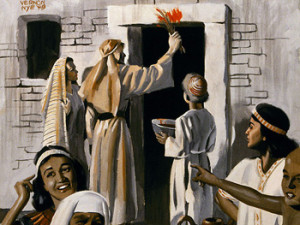“Take a bunch of hyssop leaves and dip it in the blood which is in the basin, and smear it on the two sides and top of the door-frame. Then, none of you is to go out the door of his house until morning.”-Exodus 12:22
I once heard a pastor say something interesting about the exact spots on the doorframe where the blood of the lamb was applied.
The blood was to be smeared on top of the door where it would drip into a basin placed at the bottom and then on each side of the upper part of the doorframe.
Now what happens when you connect the blood spots from top to bottom and left to right?
You get a perfect cross, that’s what.
I’m not saying that this admittedly forced symbolism is what God intended nor proper Biblical exegesis, but I think it’s a nice little mental trick to remind ourselves that while Passover no doubt signified real deliverance for the Israelites from slavery in Egypt it also pointed to the ultimate sacrifice of Yeshua on the cross for the sins of mankind.
So why is the Hyssop branch significant?
Actually, what exactly is Hyssop?
According to the dictionary, it is an aromatic herb whose twigs were used in ceremonial sprinkling.
However, today, no one is quite sure what plant or tree the Hyssop actually was.
I heard they sell a spice called Hyssop in Israeli markets but they will be honest and tell you up front that it’s not the same Hyssop mentioned here in Exodus.
The general scholarly consensus is that it was a species of what we call Oregano.
In Bible typology, the Hyssop symbolized purification.
Once we get into the Book of Leviticus, we will see that hyssop was applied together with other substances to a person who had recently been healed from a skin disease and even used to purify a house that had previously contained mold.
However, it is the spiritual significance of hyssop that I find to be quite profound.
When the Hebrews used blood-dipped hyssop leaves to mark the doorways of their homes, it signified that God had set apart His people as “pure” and not targets of the judgement God was about to dole out.
King David echoes the spiritual significance of hyssop in his prayers for deliverance to the Lord.
“Cleanse me with hyssop,
and I will be clean;
wash me,
and I will be whiter than snow.”
-Psalm 51:7
Here David is NOT referring to physical cleansing.
He is asking God to cleanse him spiritually as he confesses his sin.
Finally, hyssop also appears at Yeshua’s crucifixion.
When the Roman soldiers offered Yeshua a drink of wine vinegar on a sponge, it was placed at the end of a stalk of hyssop.
This was Yeshua’s last act before He declared His work on earth finished.
Don’t you find it interesting that the Roman soldiers unknowingly chose this particular plant?
Just as in the Torah blood and hyssop are used to purify a defiled person, we see the exact same symbolism in the sacrifice of Yeshua.
No doubt God meant this a picture of purification, as Yeshua bought our forgiveness with His sacrifice.
CONNECTING THIS TEACHING TO THE NEW TESTAMENT
Later, knowing that everything had now been finished,
and so that Scripture would be fulfilled,
Yeshua said, “I am thirsty.”
A jar of wine vinegar was there,
so they soaked a sponge in it,
put the sponge on a stalk of the hyssop plant,
and lifted it to Jesus’ lips.
When he had received the drink, Jesus said,
“It is finished.”
With that,
he bowed his head and gave up his spirit.
-John 19:28-30




Please read and answer the verse in the Holy Bible Exodus 23;20-21, John 5;43, Proverbs 30;4 and Micah 6;9, Isaiah 24;15, Malachi 1;11 KJV.
Alright Joshua, here are the verses you’ve thrown at me.
“I am sending an angel ahead of you to guard you on the way and bring you to the place I have prepared. 21 Pay attention to him, listen to what he says and do not rebel against him; because he will not forgive any wrongdoing of yours, since my name resides in him.”-Exodus 23:20-21
“I have come in my Father’s name, and you don’t accept me; if someone else comes in his own name, him you will accept.”-John 5:43
Who has gone up to heaven and come down?
Who has cupped the wind in the palms of his hands?
Who has wrapped up the waters in his cloak?
Who established all the ends of the earth?
What is his name, and what is his son’s name?
Surely you know!
-Proverbs 30:4
The voice of Adonai! He calls to the city —
and it is wisdom to fear your name —
“Listen to the rod and to him who commissioned it.
-Micah 6:9
So in the east, honor Adonai ;
in the coastlands, honor the name of Adonai,
the God of Isra’el.
-Isaiah 24:15
For from farthest east to farthest west my name is great among the nations. Offerings are presented to my name everywhere, pure gifts; for my name is great among the nations,” says Adonai-Tzva’ot.-Malachi 1:11
I recall you posted the same comment on the Asia Torah site.
Please clarify. What point are you trying to make here?
The comments of Joshua has no connection with the said topic at all.
The comments of Joshua has no connection with the subject matter at all.